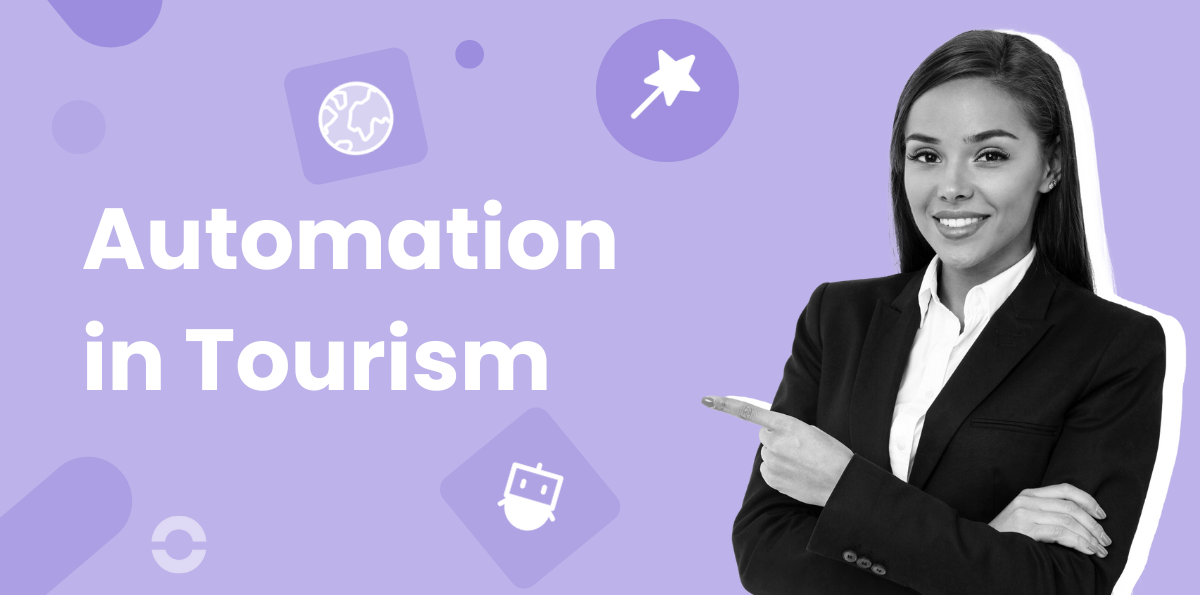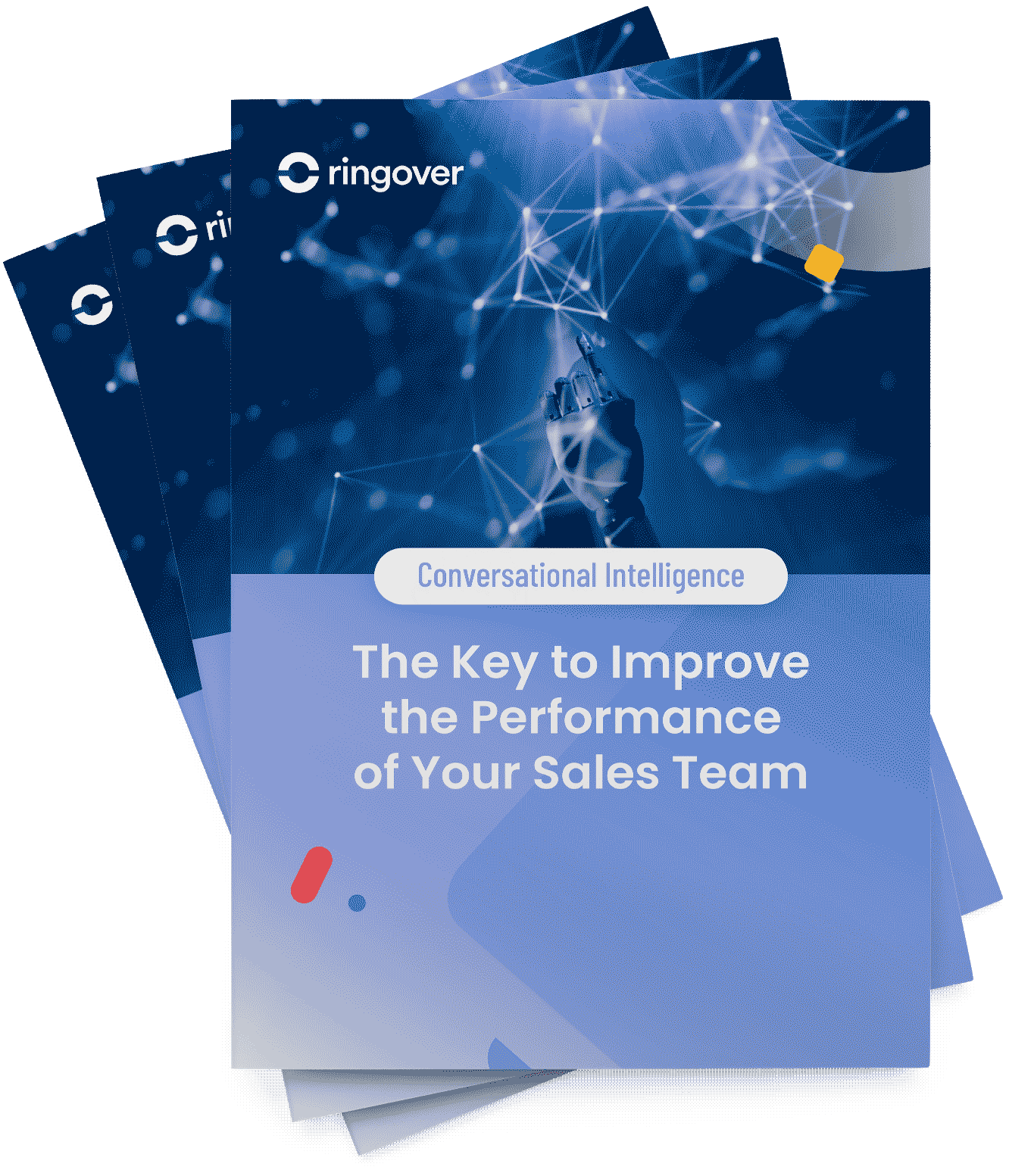Summary
The tourism sector has been undergoing a profound transformation in recent years, driven by changing digital behaviours and rapid technological advances. In this context, automation in tourism has emerged as a strategic lever–one that optimises operational management while enhancing the customer experience before, during, and after the trip.
Discover Ringover's AI Assistant
Among travel and hospitality businesses across the US and UK, the adoption of AI-driven tools is accelerating. In fact, over 60% of large hospitality brands in both markets report using AI to enhance operations such as reservations, marketing automation, and customer experience management [1].
In North America, the region represented approximately 38.7% of the global AI-in-tourism market in 2024, underscoring strong investment in AI-powered guest management and predictive analytics [2].
Another indicator of global momentum: the AI in travel and tourism market, valued at $2.95 billion in 2024, is projected to reach $13.38 billion by 2030, reflecting rapid growth in both the US and UK travel sectors [3].
Let's take a closer look at how automation is reshaping the tourism landscape in practical, measurable ways.
5 Key Areas Where Automation Is Changing the Game
Automation in tourism is far more than a passing trend–it's already redefining the customer journey, streamlining operations, and offering travellers a smoother, more personalised experience.
Here are five concrete examples of how automation is transforming the industry.
1. Automated Bookings and Check-Ins
The booking process is arguably the area where automation has had the most significant impact.
Online platforms such as Booking.com and Expedia now use intelligent systems capable of comparing thousands of options within seconds.
In the hotel industry, automated check-in via interactive kiosks or mobile apps allows guests to access their rooms directly using a digital key, without stopping at reception. Beyond reducing wait times, this automation frees up staff to focus on higher-value, personalised guest services.
2. Chatbots and Multilingual Assistance
Chatbots play a central role in the automation of tourism. They streamline customer interactions by delivering instant, contextual responses–day or night, and in multiple languages.
This 24/7 availability is particularly appealing to international travellers seeking simplicity and responsiveness.
Ringover's AI Assistant is a prime example of this evolution. Designed to understand visitor intent and engage in natural conversation, it leverages company data to provide relevant, contextualised recommendations.
This could mean suggesting activities tailored to a traveller's profile, explaining cancellation policies, or highlighting complementary options such as an upgrade or airport shuttle service.
The true value of automation doesn't just lie in its ability to handle repetitive or recurring questions–it also acts as a powerful force multiplier. It lightens the workload of front-desk teams while simultaneously driving higher conversion rates.
In other words, the assistant becomes both a support tool and a sales enabler, enhancing the perceived value of the customer experience.
3. Dynamic Pricing and Revenue Management
Inspired by the pricing models of airlines, dynamic pricing has quickly spread to hotels and even vacation rentals.
The goal is to automatically adjust prices to optimise occupancy rates while maximising profitability. Once reserved for large hotel chains, this practice has now become accessible to smaller businesses thanks to affordable SaaS solutions.
4. Immersive Experiences and Automated Guidance
Beyond operational logistics, automation is also enriching the travel experience itself. Mobile virtual guides or intelligent audio tours now offer visits tailored to each traveller's interests.
Museums are integrating augmented reality tours, where a smartphone reveals hidden layers of information. Tourism offices are experimenting with voice assistants that suggest itineraries based on user preferences–whether cultural tours, outdoor activities, or culinary experiences.
These tools offer visitors a differentiated, modern experience while reducing reliance on on-site staff.
5. AI-Driven Marketing and Loyalty
Automated marketing has become a cornerstone of customer relations. Tourism-focused CRM platforms analyse collected data–travel history, declared preferences, and online behaviour–to send key communications.
For example, a guest who booked a ski trip might automatically receive an offer for the next winter season or suggestions for complementary activities.
These campaigns–distributed through email, SMS workflows, or mobile notifications–strengthen customer loyalty while increasing the lifetime value of each traveller.
What Are the Benefits of Automation in the Tourism Sector?
Adopting automation in tourism fundamentally transforms how organisations operate, benefiting both professionals and travellers alike.
Saving Time and Boosting Operational Efficiency
Picture a hotel front desk during peak season: long lines, impatient guests eager to check in, and overwhelmed staff juggling calls, check-ins, and special requests.
In this context, automation acts as a behind-the-scenes ally. Online booking systems synchronised with scheduling tools, smartphone check-ins, and automated confirmation messages free teams from much of the logistical burden.
The result? Less paperwork, greater availability to welcome guests, offer guidance, and anticipate customer needs.
A Smoother, More Personalised Customer Experience
For travellers, the benefits are immediate. The journey becomes simpler, with no redundancies or friction.
Booking a room, selecting transportation options, receiving recommendations, or asking questions via a virtual assistant–all happen seamlessly.
Automation makes the promise of a frictionless stay possible, where every interaction feels tailor-made.
Reduced Costs and Fewer Errors
In an industry where margins are often slim, eliminating repetitive manual tasks has a dual benefit.
On one hand, operational costs drop as automated systems take over part of the workload. On the other hand, reliability improves, since human errors–such as double bookings, missed confirmations, or incorrect entries–are minimised by standardised workflows.
For a hotel, this prevents delicate situations such as having to relocate guests due to overbooking–avoiding both financial losses and damage to reputation.
Better Demand Forecasting
Thanks to real-time data analysis, automation enables better forecasting and adaptability.
Whether adjusting prices to match demand, anticipating peak periods, or staffing up during critical times, decisions are made based on reliable indicators. It's a way to ensure both profitability and peace of mind in daily management.
Key Challenges of Automation in Tourism
While automation in tourism offers exciting opportunities, it also raises important questions. Behind the promise of efficiency and fluidity lie human, technological, and ethical challenges that the industry must address.
Finding the Balance Between Technology and Human Touch
Even with financial and operational pressures, travel is not just a transaction. For customers, it's about emotions, discovery, and memorable experiences.
Automating the entire journey risks stripping away that relational dimension. Take, for example, a couple arriving at a hotel to celebrate their wedding anniversary: no check-in kiosk or friendly robot can replace a warm greeting.
The goal, therefore, is to use automation as an invisible safety net — one that removes friction while preserving the human connection.
Securing Personal Data
Every digital interaction generates data: travel preferences, payment details, spending habits.
For tourism operators, leveraging this data enables personalisation–but it must be backed by strong data protection guarantees.
Recent cyberattacks targeting the hospitality sector serve as a stark reminder that data security is both a strategic priority and a matter of trust [4].
Supporting Workforce Transformation
Automation is reshaping the nature of work. Some administrative tasks are disappearing or evolving, while new skills are becoming essential–from managing digital tools to analysing data and overseeing AI solutions.
Tourism professionals must therefore be supported through this transition to avoid a gap between the technology's potential and the teams' ability to use it effectively.
Optimise your customer journey with Ringover’s AI assistant, saving your team time and creating a stellar customer experience.
Making Innovation Accessible to All
Finally, a major challenge lies in democratising access to these technologies. While airlines and major hotel chains have ample resources, small businesses–such as guesthouses, local agencies, and regional tourism boards–should also have access to affordable, easy-to-implement solutions.
It may seem idealistic, but automation will only have a true industry-wide impact if it benefits the entire ecosystem.
What Trends Should You Watch for in 2026?
Automation in tourism is still in its early stages. Behind the existing solutions, new developments are emerging that promise to drive even deeper transformation in the years ahead.
The Rise of Generative AI in Travel Planning
Soon, planning a trip could feel like having a conversation. Generative AI is already capable of creating full itineraries based on user preferences–culture, cuisine, sports, or relaxation.
For travel agencies and online platforms, this paves the way for highly personalised experiences, where inspiration and booking merge seamlessly. Digital concierge services are entering a new era.
Robotic Assistance and Automated Services
In some airports and pilot hotels, robots now greet guests, carry luggage, or provide information about available services.
Beyond the “wow” factor, these mechanical assistants could become valuable allies during peak times, ensuring a consistent, multilingual first level of service.
Toward Hyper-Personalised Recommendations
With real-time data analysis, every traveller can receive unique suggestions–a tour aligned with their interests, a restaurant that matches their culinary preferences, or even a room set up exactly to their liking.
This hyper-personalisation is becoming the new standard in tourism, where each stay feels like a one-of-a-kind experience.
The Integration of Voice and Smart Assistants
Voice interfaces are evolving quickly. Soon, asking a connected speaker or smartphone could be enough to book a ticket, check schedules, or get local recommendations.
For tourism professionals, the challenge will be to seamlessly integrate these voice-based channels into the customer journey.
Toward an Enhanced Tourism Experience Through Automation
Automation in tourism addresses travellers' ever-growing expectations while helping professionals tackle operational challenges. From smoother bookings to hyper-personalised experiences, and from cost reduction to process optimisation, it is already reshaping a fast-evolving industry.
However, technology's purpose is not to replace humans, but to assist them. The real value of automation lies in striking the right balance–letting tools handle repetitive tasks while elevating the warmth, empathy, and quality of human interaction.
In this transformation, solutions like Ringover's play a key role. With its AI Assistant and integrated communication ecosystem, Ringover helps tourism professionals digitise and enhance the customer experience. Curious to know more? Get in touch!
Automation in Tourism FAQ
What is automation in tourism?
Automation in tourism refers to the use of technologies (AI, chatbots, and automated management tools) to simplify and optimise both the customer journey and internal operations.
It applies to areas such as reservations, check-ins, customer service, dynamic pricing, and marketing.
What automation tools are available today for tourism?
There are many options: multilingual chatbots, reservation management systems, revenue management platforms, virtual assistants, and integrated CRM solutions.
Companies like Ringover offer AI assistants and communication tools that enhance customer relationships while supporting the sector's digital transformation.
How does automation impact the customer experience?
It makes the journey smoother and frictionless. For instance, a traveller can book a room, receive confirmations, and chat with an AI assistant within minutes–without waiting or repeating information. Automation also enables personalised recommendations based on each traveller's preferences.
What are the main challenges of automation in tourism?
The biggest challenge is finding the right balance between technology and human touch. Automation should ease workloads without replacing human hospitality, empathy, and advisory roles. Data protection and ensuring accessibility for smaller businesses are also key priorities.
Will automation replace jobs in tourism?
No. Automation eliminates the most repetitive tasks but does not replace the human value that makes travel meaningful–the sense of welcome, personalised advice, and emotional connection. Tourism jobs are evolving toward management, personalisation, and relationship-building rather than disappearing.
Citations
- [1]https://www.deloitte.com/uk/en/Industries/consumer/blogs/embracing-the-future.html
- [2]https://www.grandviewresearch.com/industry-analysis/artificial-intelligence-ai-tourism-market-report
- [3]https://www.prnewswire.com/news-releases/artificial-intelligence-in-tourism-market-worth-13-38-billion-by-2030-exclusive-report-by-marketsandmarkets-302333370.html
- [4]https://www.rfi.fr/fr/europe/20250814-italie-une-cyberattaque-cible-des-h%C3%B4tels-et-pirate-des-dizaines-de-milliers-de-passeports
Published on November 10, 2025.


